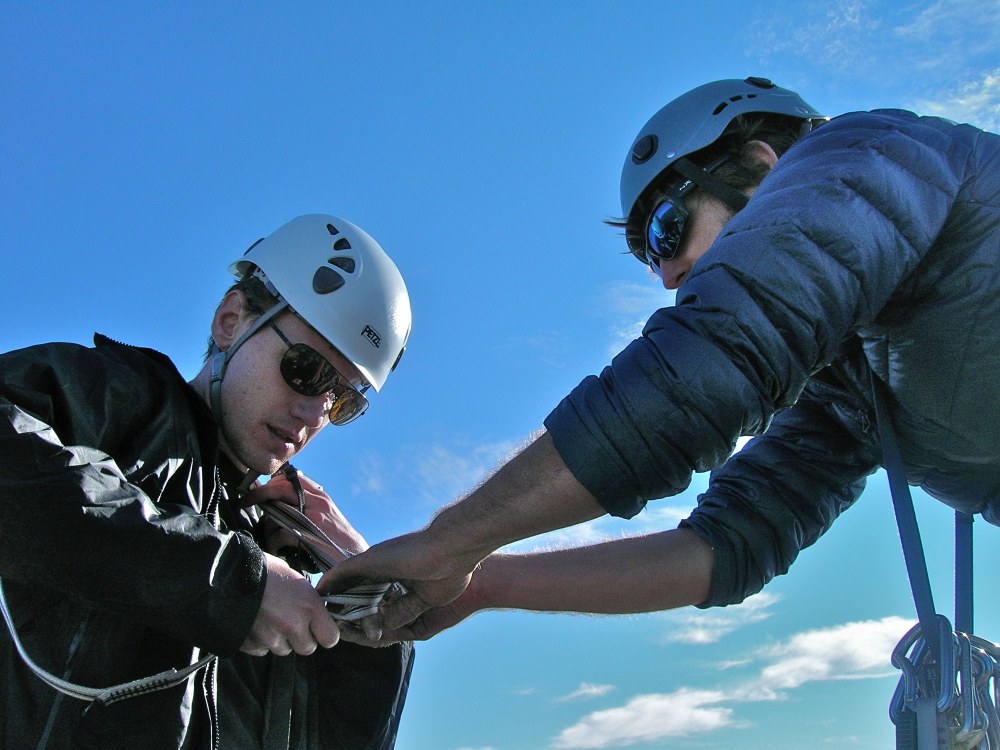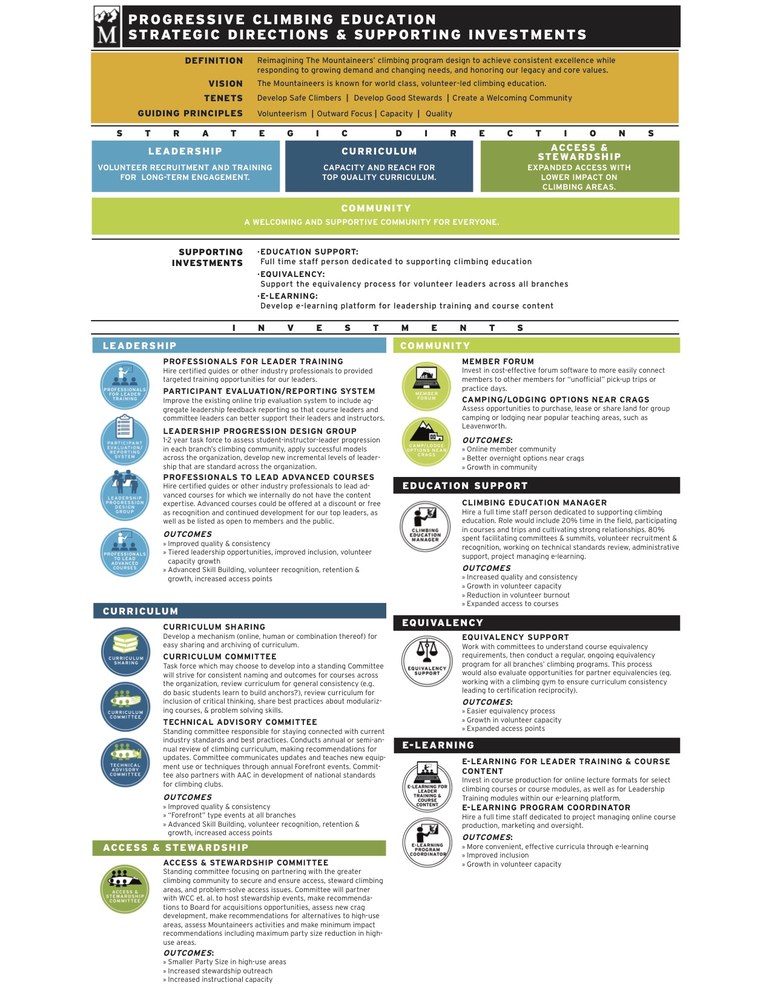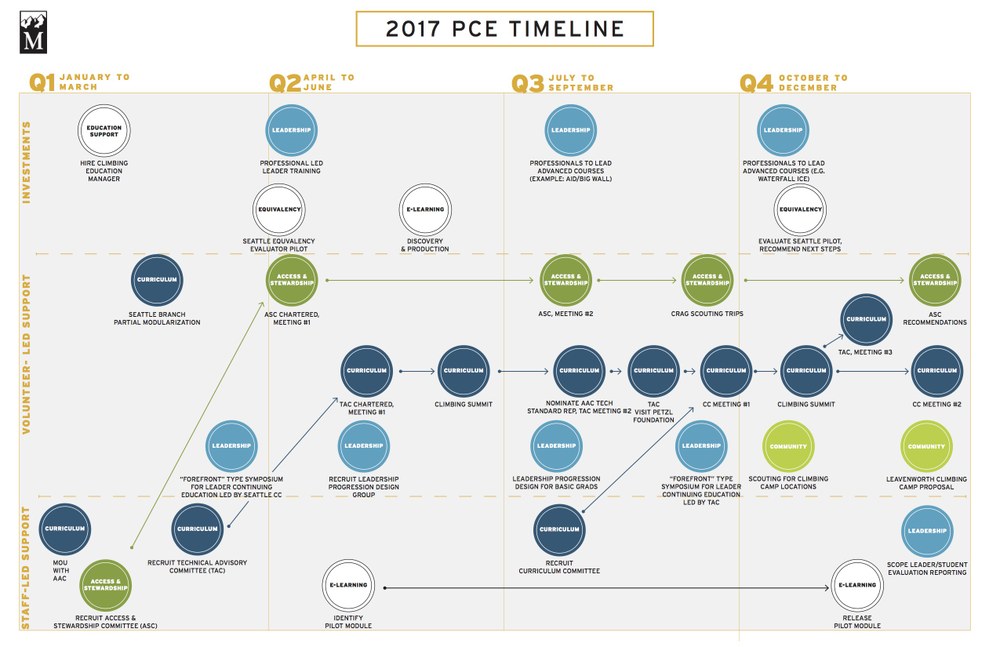
In mid-2016, The Mountaineers Board of Directors voted to allocate funds to begin a project called Progressive Climbing Education. The goal was to dedicate resources to advance the goals and initiatives of our passionate volunteers. Done well, these strategic investments will make our suite of volunteer-led Climbing Programs more fun for volunteers to run, easier to recruit volunteers for, more attractive to new climbers (especially those coming out of the gym), and more advanced for our highly-skilled volunteers and students.
On January 12, 2017, the Board of Directors ratified a multi-year Progressive Climbing Education Plan and approved $131k to fund the first phase of work in 2017.
The Vision
Over the course of about 6 months, the project steering committee worked hard to gather input from constituents within Mountaineers climbing programs and also in our broader climbing community. Learn more about the entire process.
Vision Statement
So what were we trying to achieve? What were the goals? We worked hard to come up with a clear vision statement: "The Mountaineers is known for world-class volunteer-led climbing education."
We think this statement is timeless. Our legacy comes from pioneers in climbing education and our core is the volunteers who lead our programs. We want to ensure that as climbing changes and as our world changes, The Mountaineers continues to offer world-class volunteer-led climbing education.
Tenets
From this vision, we needed to define our outcomes. Climbing education can take on a lot of forms, and we wanted to find a thread that was uniquely Mountaineers and could span across courses. We adopted 3 Tenets of Climbing Educaton:
- We develop safe climbers.
- We develop good stewards.
- We create a welcoming community.
Guiding Principles
- Volunteerism - Decisions and actions must support the volunteer culture, enhance the volunteer experience and build a vibrant community.
- Outward Focus - Decisions and actions should seek out partnerships with like-minded organizations to expand capacity, share resources, protect our wild places and reach more climbers.
- Capacity - Decisions and actions should support a community that welcomes everyone, with the ideal of making everyone a safe climber and good steward.
- Quality - Decisions and actions should build on a legacy of pioneering climbing education and grow that legacy as a long-term, high-quality, and sustainable force in the climbing community.
The Road Map
As we met with climbing communities throughout The Mountaineers, we discovered that some needed improvements seemed to be in conflict with one another. In other words, with our current structure and resources, improvements in one area would lead to a deficit in another. We realized that in order to avoid this becoming a zero-sum game, we would need to creatively address our challenges holistically, from multiple angles.
The result is a systems approach - investing in multiple systems simultaneously to have a net gain in all areas.
Leadership
We must invest in volunteer recruitment and training for long-term volunteer engagement. All of our branches and committees expressed a concern with volunteer burn-out and a lack of supply of volunteers to meet the needs of the students. We can address this through a combination of growth, retention, and efficiency. Are we making the best use of our volunteers' time? What causes volunteers to burn out? What would inspire them to stick around? How do we get more volunteers as quickly as possible?
- Professionals for Leader Training - A pretty unanimous concern among climbers in The Mountaineers is the lack of train-the-trainer opportunities. Our instructors have great technical skills, but don't have much or any formal training in teaching or leadership skills. We will invest in professionals to lead these types of trainings.
- Leader Evaluation Reporting System - Our website does a good job of collecting student feedback and giving the leader a chance to see how their students felt, but we don't have a good aggregate reporting system so that committee and course chairs can provide support and recognition for their leaders and instructors based on feedback. We plan to invest in this system.
- Leadership Progression Design Group - This is a big meaty one. We are bringing together volunteers from each branch's climbing committees to re-design our leadership progression. Currently it is a cumbersome bureaucratic process to become a Climb Leader, and each branch has slight different definitions and varieties of Climb Leader. We also have lots of less-technical activities run by highly-qualified climb leaders because we don't have entry-level leadership designations. The Leadership Progression Design Group will be tasked with developing a leadership progression that is easy to understand, consistent across branches and helps students become leaders early and progress in status.
- Professionals to Lead Advanced Courses - At some point our highly skilled volunteers run out of personal skill building opportunities at The Mountaineers. All that's left to do is volunteer. We want to continue to build our volunteers' skills both to keep them fresh and to make it rewarding to remain a part of The Mountaineers. We will invest in professionals to teach high-level courses such as Water Ice Climbing and Aid & Big Wall seminars.
Curriculum
- Curriculum Sharing - We will invest in an easy, user-friendly way for committees and volunteers to share their curriculum with one another and pass on curriculum from one leader to the next.
- Curriculum Committee - We will bring together volunteers from all branch's climbing committees to inventory our current courses and curriculum, standardize curriculum across branches, and then work to expand course offerings, including short-course modules to meet the needs of busy climbers.
- Technical Advisory Committee - We will bring together volunteers from all branch's climbing committees to make annual recommendations for climbing techniques to be used organization-wide. This committee will be charged with keeping abreast of new technical and gear developments as well as industry standards, recommending changes to committees, and implementing a training plan to ensure any changes are adopted by all branches.
Access & Stewardship
- Climbing Access & Stewardship Committee - We will bring together volunteers from each branch's climbing committee to address our access issues and promote stewardship of our climbing areas. This committee will be charged with scouting, identifying and developing new climbing areas, partnering with local agencies to conduct stewardship projects, making recommendations to our climbing committees about party size reduction where needed, and participating in advocacy efforts to promote access to public lands.
Community
- Member Forum - We will invest in technology to create a member forum within our website so that members can find other members to go on climbs or practice skills with. This will help to promote the "club climbs" culture that once existed without burdening our climb leaders to lead "club climbs."
- Camping & Lodging Options near Crags - One of the things that builds community during courses, and also creates a lot of headache for course leaders, is group camping. If we invest in Mountaineers property near common climbing areas, we reduce the workload for our leaders and help to build community by creating a group living space.
Supporting Investments
Climbing Education Manager
While we will rely on our volunteers to be the drivers of these initiatives, we also recognize that our volunteers are already overbooked. By providing staff support for this initiative, our volunteers can lend their brain power and creativity with staff support get the work done.
This position is responsible for supporting volunteers to ensure high quality, state of the art climbing education throughout our organization. While this position will support all volunteers, they will focus on our climbing programs, with support for our snowshoe, backcountry ski and scramble programs. Snowshoeing, Backcountry Skiing and Scrambling require overlapping technical skills so this role will help ensure that we have consistent practices for backcountry snow and rock travel. This position will work with the Kayak, Hike & Ski Education Manager and the Member & Volunteer Support Manager to develop and support sustainable systems that promote a healthy volunteer culture in a volunteer-driven organization with volunteer-delivered programs.
Equivalency Support
One of the major inefficiencies and points of frustration for our students and instructors is our lack of a streamlined equivalency program. We want to be able to welcome skilled students by recognizing their skills and allowing them to enroll in courses they qualify for. We also want to be able to welcome new leaders and instructors who come to us with skills looking to help out. We will invest in staff support to work with volunteers to streamline our equivalency program.
E-Learning for Leader Training and Course content
This past year, we engaged in a pilot initiative with E-Learning - turning the Wilderness Navigation Seminar into an E-Learning experience. The results were not only a great student experience, but instructors reported that E-Learning students were significantly better prepared for the field trip than were students who attended the in-person seminar. We see a lot of opportunity to create E-Learning lectures to complement many of our climbing courses as well as train-the-trainer seminars. We will invest in production and staff support to continue our E-learning efforts, which will aid with both consistency and efficiency for our climbing courses.
Timeline
We believe this project will take 5 years to show a measurable return on investment, although we will start to see improvements after the first year. While we have a plan in place, and the plan is based on well-informed input from hundreds of constituents, much of the execution will be experimental. We expect to review the plan on a regular basis and make changes as we go. Below is a project timeline detailing the first year of PCE - click on the image for a closer view.
Here's what we're getting started with right now:
- Hiring the Climbing Education Manager. Check out the job description here (note:we will also be re-hiring our Leadership Development Manager as a re-designed position to serve our Hiking, Sea Kayaking and Nordic Ski programs).
- Recruiting the Leadership Progression Design Group. If you're interested in being a part of this group, fill out the interest form!
- Recruiting the Curriculum Committee. If you're interested in being a part of this group, fill out the interest form.
- Recruiting the Technical Advisory Committee. If you're interested in being a part of this group, fill out the interest form.
- Recruiting the Climbing Access & Stewardship Committee. If you're interested in being a part of this group, fill out the interest form.
 The Mountaineers
The Mountaineers

